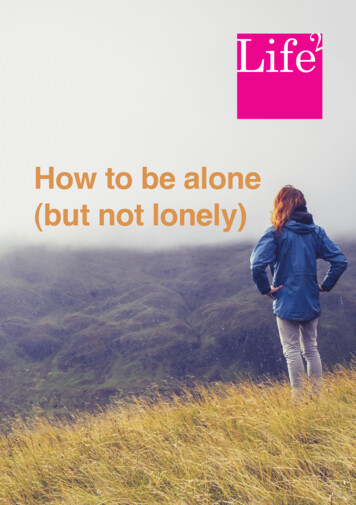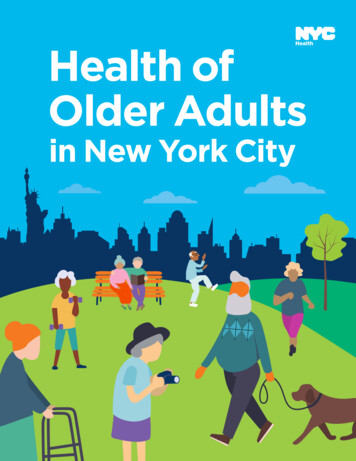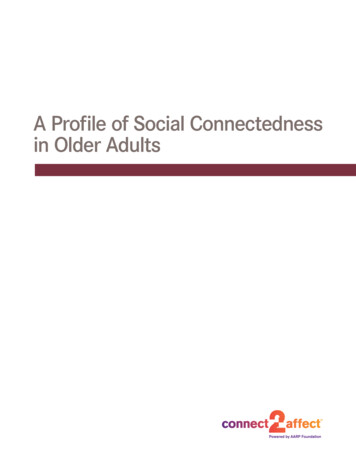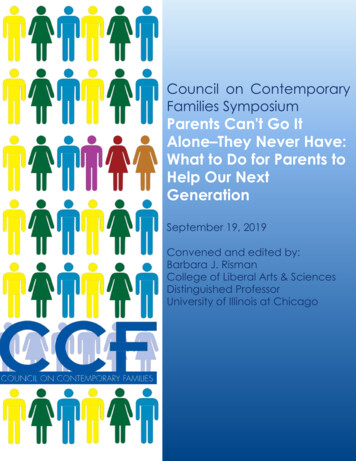
Transcription
How to be alone(but not lonely)
This booklet is one of a series by Life Squared. Ourbooklets explore important topics and ideas, and providepractical suggestions on ways you can improve your life.Life Squared is a not-for profit organisation that helpspeople to live well – to live happy, wise and meaningfullives within the pressures and complexity of themodern world. We aim to provide you with ideas,information and tools to help you get more out of life,see things more clearly and live with greater wisdom.We offer guides, courses, ideas and advice on awide range of topics, from ‘How to get involvedin your community’ through to ‘How to chooseyour own pace of life’, and from ‘The problem withconsumerism’ through to ‘How to be happy’.For more information visit www.lifesquared.org.ukt Life squared f Life-Squared y LifeSquared2How to be alone (but not lonely)
How to be alone(but not lonely)
Published by Life SquaredRegistration number: 7190658Registered address: 18 Hamsey Crescent,Lewes, East Sussex BN7 1NP, yright 2015 Life Squared. No partof this book may be reproduced in anyform without the publisher’s permission.Please contact Life Squared if you wishto syndicate this information.Design by Mobius, www.studiomobius.co.ukImages from Thinkstock
ContentsIntroduction2Loneliness - the social disease4The joy of solitude14How to be alone (and not lonely)22Conclusions31How to be alone (but not lonely)1
IntroductionIs it a good thing or a badthing to be alone? Opinionseems to be divided.Some experts argue that loneliness is a modern socialproblem comparable with smoking in its negativeeffects on our health, whilst others argue that solitudeis good for us and we should seek more of it in our lives,especially in the fast-paced, people-packed modernworld.Things are clearly a bit more complicated than this,and this booklet explores what it means to be alone inmodern society, including the problems of loneliness,the useful possibilities of solitude and the influencemodern society has on both these things. Ultimately, itprovides some practical ideas on how to both reduce ourloneliness and explore the benefits of solitude(if we want to).2How to be alone (but not lonely)
There seems to be a significant difference betweensolitude and loneliness - and perhaps the two statescan be distinguished as follows: solitude is a voluntarystate, brought about by a choice to be alone, whereasloneliness is a negative state we haven’t chosen to bein, where we feel alone and isolated. And it’s often‘feel alone’ rather than ‘are alone’ as loneliness is morecomplex than just actually being alone. For manypeople, loneliness could simply be a feeling of beingalone and isolated in the world - even if they havea rich social life and many friends.This distinction between ‘feeling alone’ and ‘being alone’will be important towards the end of the booklet whenwe start looking at some of the ways we can overcomeloneliness - as many people not only need to deal withthe practical situation of being alone, but also the(perhaps more troublesome) psychological side of feelingalone - no matter how much we surround ourselveswith people.We’re attempting to cover a lot of ground in this booklet,as we want to discuss these two big issues togetherbecause we feel they are linked - but this may meanthat we have to sacrifice some detail and just skim thesurface of particular issues in order to do this.There is a list of ‘further reading’ at the end of thebooklet to give you options to continue looking at theseimportant topics.How to be alone (but not lonely)3
Part 1Loneliness –the social disease4How to be alone (but not lonely)
Loneliness – the social diseaseThere are evolutionary reasons why wedeveloped the ability to feel the pain of socialisolation. It’s been argued that lonelinessdeveloped as a stimulus to get humans topay more attention to their social connections,and to reach out toward others, to renew frayedor broken bonds’.1 It was a response thatevolved to try to prevent the individualbecoming socially isolated.Research has shown that we have both mental andphysical reactions to feelings of loneliness. It thereforehas the potential to become a chronic, harmful conditionif left unchecked, and in recent years the evidence hasbuilt as to just how potentially harmful it can be.For example, a recent study 2 by the Universityof California suggests that adults who describedthemselves as lonely or isolated had a 45 percentgreater risk of dying earlier than older adults who feltmore connected to others. They were also more likely toexperience faster ‘functional decline’ in the ability to dobasic tasks like housework.Evidence like this has recently led some experts tosuggest that “Social isolation has an impact on healthcomparable to the effect of high blood pressure, lack ofexercise, obesity or smoking”3.How to be alone (but not lonely)5
According to the mental health charity Mind,“Loneliness and social isolation can have a significantimpact on your mental health. Studies have shown thatpeople who are socially isolated experience more stress,have lower self-esteem and are more likely to have sleepproblems than people who have strong social support.Being lonely can also contribute to mental healthproblems, such as anxiety and depression.4In their 2010 report ‘The Lonely Society?’ the MentalHealth Foundation notes “Research shows that‘loneliness becomes an issue of serious concern onlywhen it settles in long enough to create a persistent,self-reinforcing loop of negative thoughts, sensationsand behaviours’. In other words, it is long-term, chronicloneliness that wears us down rather than lonelinessthat is ‘situational’ or passing.”5There is no doubt then that we need to address it - bothas a society and in our own lives if we are experiencingit. But what is loneliness? It’s not necessarily the factthat you are alone at a given point in time, but morethe feeling of being isolated. It’s about our sense ofconnection with other people and the quality of thisconnection - rather than the number of people and theirpresence at a particular moment.6How to be alone (but not lonely)
What makes people lonely?Loneliness can affect people in many different waysand can be caused by a range of things. We can splitthese into two groups - situations which we are sociallyisolated and pre-existing feelings of loneliness.Your situation - there may be aspects of your life andsituation that make you isolated or at risk of feelinglonely - for example, if you:– have recently lost someone close to you or split upfrom a partner– are less mobile or well and are unable to leave thehouse on your own– have moved away from existing social networks including moving to a new area, getting a new jobor retiring– have few opportunities for social activities perhaps due to lack of money or illness– have been through bad relationships or abuse- which may have made it hard for you to buildclose relationships with others.Your feelings - some people feel a strong, ongoingsense of loneliness, no matter how many people theysurround themselves with and how busy they are.These feelings may arise for a range of reasons,including a lack of self confidence, feelings oflow self-worth, a history of abuse, trauma or badHow to be alone (but not lonely)7
relationships or simply having been exposedto prolonged periods of isolation or lonelinessin the past.These internal feelings can lead to a number ofdifferent consequences - from the desire to shutyourself off from other people and a fear of engagingsocially, to the opposite - an attempt to keep as busyand socially involved as possible - perhaps evenresorting to more extreme forms of stimulation suchas drugs.Loneliness and the modern worldIn the modern world, we are surrounded by morepeople than ever before, are better connected via socialmedia than ever before and many of us have greaterinternational mobility than ever before, so it seemscounter-intuitive to suggest that we are generally nowmore isolated than we ever have been. But the latestevidence seems to suggest that we are.For example, in October 2014, The Guardian newspaperreported that “the Office for National Statistics foundBritain to be the loneliness capital of Europe. We’reless likely to have strong friendships or know ourneighbours than residents anywhere else in the EU.”6It also appears that loneliness is affecting people ofdifferent ages and walks of life. For example, it is nowreasonably well known that the elderly are becomingincreasingly vulnerable to loneliness and isolation.8How to be alone (but not lonely)
As George Monbiot notes “A study by Independent Ageshows that severe loneliness in England blights thelives of 700,000 men and 1.1m women over 50, and isrising with astonishing speed.”7A very sad figure is quoted by the Campaign AgainstLoneliness - “Two fifths all older people (about 3.9million) say the television is their main company(Age UK, 2014).”8But, as The Guardian reports, it’s not just older peoplewho are being increasingly affected by loneliness. “In2010 the Mental Health Foundation found lonelinessto be a greater concern among young people than theelderly. The 18 to 34-year-olds surveyed were morelikely to feel lonely often, to worry about feeling aloneand to feel depressed because of loneliness than theover-55s.”9So, it seems that loneliness is a problem spreadingacross the modern westernised world. But why is thishappening now? Below are some possible contributingcauses.The atomisation of societyThe typical family unit in the UK changed radicallyin the twentieth century, moving from the extendedfamily living together or close to each other, through thenuclear family (‘2.4 children and a dog’), to the growingmodern trend for living on one’s own. According to theJoseph Rowntree Foundation, in 2006 around 14%of the population in England lived alone – more thanHow to be alone (but not lonely)9
double the proportion (6.5%) that did so in 1971.10As well as this change, ease of travel, improvedcommunications and changes in work culture (amongstother things) have led many families to becomescattered, not just around one country, but across theworld. Such families may only get together once a year,sometimes even less.These changes to the family unit have left certaingroups of people in greater risk of isolation, includingthe elderly, who in other periods may have remainedpart of the family unit with all the support and socialinteraction this entails, but who are now often cut adriftfrom these units and left to their own devices or, inolder age, the care of institutions.Changes in the idea of communityOur idea of community has changed over recentdecades. The idea of community based on connectionto one’s locality and neighbours seems to have faded,along with our opportunities to meet people in ourneighbourhoods through the cutting back of publicand local services such as post offices and publictransport. Our relationship with our communities hasalso changed, as rather than being immersed in themon a day to day basis as before, many people now onlyhave a transient relationship with their local area andcommunity - commuting in and out at the start and endof each day.It could be argued that other types of community have10How to be alone (but not lonely)
grown ( such as those relating to a sense of connectionwith political causes) whilst local communities havebeen on the wane, but it is clear that there has beena decline in our overall sense of community. Forexample a survey by the University of Sheffield for theBBC in 2008 “concluded that a sense of community hadweakened in almost every area of the UK over the past30 years.”11The influence of turbo capitalism and individualismThe influence of the defining philosophy of our time canbe seen to contribute to a greater sense of lonelinessand isolation in a number of ways - here are just a fewexamples:We are spending more time at work - as suggestedby the Mental Health Foundation, “socialising andinvesting time in social ties are generally seen as lessimportant than ‘productive’ activities like work”12 sowe are investing more time in these ‘economicallyproductive’ activities to the detriment of our sociallives and sense of connection.We’ve become more materialistic - we’ve becomefixated on consumerism and the acquisition ofmaterial goods, following the line fed to us byadvertisers, companies and governments thatincreased material wealth and consumption willmake us happier, when the evidence shows that,beyond a certain, surprisingly low, point - around 15,000 a head GDP in 2003 prices13, it doesn’t.How to be alone (but not lonely)11
Our pursuit of these materialistic goals may haveled us to neglect the things that actually do addsomething to our lives - including good relationships,friendships and social connection.We’ve become more competitive and individualistic- following from the previous point, our sense ofwanting to connect with people has been replacedby a desire to compare ourselves with them, to bejealous of them and to compete with them for better,bigger, faster or more things.To quote George Monbiot - “The war of every managainst every man – competition and individualismin other words – is the religion of our time, justifiedby a mythology of lone rangers, sole traders, selfstarters, self-made men and women, going it alone.For the most social of creatures, who cannot prosperwithout love, there is now no such thing as society,only heroic individualism. What counts is to win. Therest is collateral damage.”14The rise of technology and social mediaThe advent of the internet and social media hasdelivered many more opportunities for greaterconnection and interaction with a wider range of people,and it’s clear that younger people are using these toolsto interact with each other in a way that is differentfrom what we’ve known in the past. It does seem thatnew technology can help to reduce social isolation.One concern however may be that this form of12How to be alone (but not lonely)
communication could change or reduce our ability tocommunicate and relate to people in other ways - suchas face-to-face. It also lacks the physical benefits thatface-to-face connection can bring us. “Research showsthat cognitive function improves if a relationship isphysical, as well as intellectual, mainly because ofthe chemical process taking place during face-to-faceencounters with others.” So, there seems to be nosubstitute for good old fashioned person-to-personcontact.For these reasons, and more, the commentator GeorgeMonbiot has argued that we are living in ‘The Age ofLoneliness’.15How to be alone (but not lonely)13
Part 2The joy of solitude14How to be alone (but not lonely)
The joy of solitude“I never found a companion thatwas so companionable as solitude.Henry David Thoreau 16”Solitude is a state into which all of us are bornand end our lives, and in which many of usspend a significant proportion of our lives inbetween. So even if you’re not the sort of personwho is naturally inclined to enjoy spending timeon their own, most of us would benefit frombeing able to adapt to the state of solitude andmake the most of it when we are faced with it.There are however many people who actively seeksolitude in their lives - short, regular periods for some,entire lifetimes for others - and find great fulfilment,pleasure, creativity and solace in spending time alone.We live however in a hyper-social age in which solitudeis regarded as a state to be avoided, and where anyonewho happens to find themselves in it should be pitied,unless they actively sought it out, in which case theyare ‘recluses’ or ‘loners’ - people who should be fearedand suspected.How to be alone (but not lonely)15
Before we look at how the modern world militatesagainst solitude, let us explore the benefits of solitude,including first a personal account of the importance ofsolitude from someone who needs it.The desire for solitudeTo give a personal perspective, I’ve always enjoyedspending time on my own, but it’s only recentlyas I’ve entered middle age that I’ve realised howmuch I genuinely need solitude on a regular basis.The realisation has emerged through a number ofobservations coming together, such as my feeling ofhaving an ‘off switch’, where, after spending a fewhours of time with people I feel the need to switch offand return to solitude and my own thoughts. Or myalmost physical sense of yearning to escape from humancompany after a certain time, or the wonderful sense ofease, balance and contentment I feel when in my owncompany.I find myself yearning for solitude - even though I havea young family who I love very much. It can be a hardthing for people close to me to understand this desirefor solitude as it can make them feel criticised andrejected. But, of course, it’s not about anything they aredoing wrong and it’s certainly not a personal slight onany of my family and friends - it’s simply a need anda character trait within me. And it’s not something I’mprepared to feel guilty about as I think it’s a perfectlyreasonable thing to need.16How to be alone (but not lonely)
I’ve been able to integrate this need for solitude intomy family and social lives, although it’s a constantbalancing act and I still don’t always get it right.This isn’t simply a selfish desire for a bit of peace(which, even in itself would not be unreasonable foranyone to have) - it is about fulfilling an essentialpart of one’s character. Everyone’s different - andsome people just need it like food and water. Here’san analogy, and if you’ve ever been in either of thesesituations you’ll understand it - remember the intensefeeling of pain when you are feeling terribly lonely?Well, the reverse can bring a similar level of suffering tosome people - when you are feeling terribly surroundedand imposed on by other people - absorbing views andopinions you have no desire to let in to your head,feeling exhausted maintaining a mask of interest andengagement in conversation with people when you’drather pull back into your own solitary space with justyour own thoughts and stillness for company.The benefits and joys of solitudeAs we’ve just seen, some people just seem ‘wired’ toneed regular periods of solitude in order to function andthink clearly. But solitude potentially has a number ofbenefits for everyone - even people who are hyper-social.These benefits include:It gives you a chance to pause and get some perspectiveand space in your life and dealings with others.How to be alone (but not lonely)17
It removes you from social pressure and can easestress.It connects you with yourself again - a vital thing,as it reminds you that you are not just the productof other people’s perceptions of you - somethingit’s easy to feel when you’re ‘out in the world’ withother people. Instead it enables you to feel an allyto yourself and feel content with your own identityrather than someone struggling against yourself.It helps mindfulness - and promotes the importantbenefits that this brings.It gives opportunities for productive mentalactivities such as creativity, problem-solving andcontemplation.Solitude and the modern worldIn the earlier section, it may have been difficult initiallyto see how the extra-busy, highly populated modernworld has helped to foster social isolation, but we haveno such problems in seeing how it also makes it difficultto gain useful solitude.We live in a world in which there is an ever-increasingpopulation, and more and more people are packinginto cities and urban areas. We now have constant,ongoing access to media (and, in consequence, otherpeoples’ voices) in our lives as a result of technology,social media, smartphones, advertising and otherdevelopments. The end result of this is a never-ending18 How to be alone (but not lonely)
stream of communication coming at each of us in ourlives, and an expectation that we need to stay in touchwith this communication (however trivial or pointlessmost of it may be) in order to ‘keep up’ with the world- with the inference being that we’ll be less successful and presumably, more isolated and lonely - if we don’t.So, it is not only practical things like the number ofpeople and omnipresence of communications frompeople that can make it harder for us to find solitudein the modern world - it is also the fact that idea ofunplugging from this barrage of communications isfrowned upon in mass society. In fact, there seems tobe an overriding attitude to solitude that sees it asa negative, suspicious and pitiful state to be in. It isincredibly unfashionable to be alone, and the languageof our society is biased against it - for example, howmany times have you seen a killer described in thenewspapers as a ‘loner’ - as if to say that this providesthe explanation for their mental instability and terriblemisdeeds.For example, since the epoch-changing moon landingsin 1969 the extrovert Buzz Aldrin has been regularlyhappy to appear in public and on TV to talk aboutthem, but the more introverted (read ‘loner’) NeilArmstrong has been far more reluctant to do so, havingseen himself as an engineer rather than an astronautor celebrity, and has only given occasional interviews.This had led to him being branded a ‘recluse’ by somecommentators, as if he were somehow a damagedHow to be alone (but not lonely)19
person or not fulfilling his duty - when his preference is,quite reasonably, to not be in the spotlight.So, these factors (and many others) combined suggestthat the modern world makes it harder than ever beforeto find solitude, and also that we live in a world inwhich we could each benefit from solitude more thanever before.So, it is a curious contradiction, but the modern worldseems to promote the worst of both worlds - it promotesloneliness in various ways and makes it harder to getuseful solitude.Final pointClearly, some people need solitude more than others,but it seems reasonable to suggest that many peoplecould benefit from it regularly in their lives, andthat certain aspects of our modern culture could bepreventing many people from both realising that theyhave a real need for it and actually pursuing it becauseit’s seen to be a bad thing.20How to be alone (but not lonely)
How to be alone (but not lonely)21
Part 3How to be alone,and not lonely22How to be alone (but not lonely)
How to be alone, and not lonelyFrom the two sections so far, it seems that beingalone can be a positive or a negative thing.There is such a thing as useful solitude (thetype that we find nourishing and full of creativepossibilities) and there’s non-useful solitude(including the type that gets negative and turnsinto loneliness).And it’s clear that the presence of people around youat a given time (whether a partner or large groups ofpeople) isn’t the key factor here. It’s how connected wefeel generally that matters. So, to combat lonelinesswe need to establish a sense of connection and ‘socialwell being’ on an ongoing basis. And this could giveus the confidence we need to enjoy being alone whenit happens - and to even seek it out regularly for thebenefits it brings us.This leads us to the subject of this final section - thepractical steps we can take to reduce feelings ofloneliness, and also to explore the benefits of solitude(if we want to).Overall, it’s about striking the right balance betweenmeeting your need for interaction as a social creatureand exploring the level and type of solitude that couldbe nourishing for you as an individual.How to be alone (but not lonely)23
How to overcome lonelinessGiven the increasing evidence of the severe effects ofloneliness on our physical and mental health it is clearwe should be doing more about it as a society, and inour own lives to fight against it - treating the fightagainst loneliness as an important part of a healthylifestyle.As we’ve already noted, a sense of loneliness can belinked to your situation and feelings - the former mightneed you to increase your level of social contact and thelatter might need you to develop ways to deal with thesefeelings. The recommendations below can’t be neatlysplit into these two areas, as each suggestion couldbring some benefits for each area. We hope though thatthey will be useful.If you’re concerned, see a doctorBefore we get into any recommendations, if you areconcerned that your feelings of loneliness are developinginto a mental health problem, you may find it helpfulto talk to your GP. Sometimes feeling lonely can feel sooverwhelming that you have suicidal thoughts. If thishappens, remember that you can pick up the phone atany time of night or day and talk to the Samaritans.Reach out to othersSome people’s feelings of loneliness stem from a senseof disconnection with other people and the world. Ifyou feel like this, you can take some simple steps toconnect with the world around you. For example, start24How to be alone (but not lonely)
by getting in touch with the people you already know,including family and friends, and just enjoy the senseof connection - even if it is just through an email orphone call.Make the most of opportunities to connectEvery day, try to make the most of any opportunities toconnect with people - however minor these might seem for example, saying hello to people while you’re walkingyour dog, or striking up a conversation witha shop keeper.Also, when you are out in social situations, make aneffort to participate. As mental health charity Mindsuggests “If you are with other people or in a groupsituation, it can be easy to stay quiet or hide behindyour phone. However, this can make you feel lonelier inthe long run. Although it may feel difficult, joining inthe conversation, even a bit, can often help you feel lessisolated17.”Meet new peopleOne effective means of reducing isolation is to findpeople with similar interests or ideas to connect withand build friendships with. There are a wide range ofways to achieve this, including through workplaces,sports clubs, social groups, parent groups, communitygroups and volunteering. The internet can be a verygood source of information on local groups with similarinterests, and can also be an effective way in its ownright to get in touch with people and begin friendshipswith people. Make sure you try to build face-to-faceHow to be alone (but not lonely)25
contact and friendships too though - for the reasonsmentioned earlier.Seek quality, not quantity of interactionsOnce you’ve started to build new social connections,try to seek a better quality of relationships rather thantrying to amass as many ‘friends’ as possible, as thiswill provide you (and them) with the most nourishingand rewarding interactions. When you are fortunateenough to develop these relationships, give time andeffort to nurturing them - really listening, giving timeand sharing your thoughts with them.Try to tackle your feelingsIf you’ve been isolated or experienced feelings ofloneliness for a long time, you may have a wide rangeof ways in which you think negatively about yourself orfeel anxiety about connecting with others. Here are a fewinitial thoughts on how to start addressing some of these:Calm yourself down - if you feel anxiety in socialsituations, try practicing some relaxation techniques- such as mindfulness and breathing control - to haveat your disposal before social situations.Get real - if you are anxious before or during a socialsituation, try to see the reality of the situation - askyourself what’s the worst that could happen if youget involved and participate. Also realise that mostother people will have their own social issues too andwill not be focussing on yours!26How to be alone (but not lonely)
Be brave and persevere - you may find socialsituations hard work and possibly stressful initially,but ‘if you can see them through then the rewards, inthe form of positive feelings, new outlooks and habitsand lasting life changes, are so great it is well worthit.Don’t be afraid to be yourself - remember all the goodthings about yourself and don’t feel obliged to mouldyourself to fit in with others in social situations. Bepolite, pleasant but be yourself - as it’s exhaustingtrying to be anyone else! See the Life Squared leaflet‘How to be yourself’ for more ideas.Seek additional helpYou may find that, despite trying to do so, you’re notable to get the level of social contact that you want, orthat your feelings of loneliness are too much for you toresolve them on your own. If this is the case, you mayfind counselling or psychotherapy useful to help youresolve these feelings. For example, cognitive behaviourtherapy (CBT) looks at how you can change anynegative patterns of thinking or behaviour that may becausing you difficulties. Mind suggests that CBT “hasbeen found to be particularly effective for anxiety-basedconditions, including agoraphobia and social phobia.18”Contact your GP or other healthcare provider if you’dlike to try a talking treatment like this, and they cangive you information and refer you to a local service.How to be alone (but not lonely)27
Start now to protect yourself from loneliness in future““Getting older doesn’t have to mean getting lonelier,”says Ruth Sutherland, the chief executive of Relate,in a new report. “But much of this rests on laying thefoundations to good-quality relationships earlier inlife.19””How to find and enjoy solitudeAs we’ve already noted, there is a lot of solitude inthe world - but the trick is to learn how to carve outopportunities for positive, nourishing solitude.We suggest that many people could benefit fromlearning to deal with, and more importantly, embracesolitude, yet the prevailing attitude in society is so‘anti-solitude’ that many people may not have had thechance to honestly evaluate whether it could be usefulfor them. So, even if you’re someone who’s built a‘hyper social’
'feel alone' rather than 'are alone' as loneliness is more complex than just actually being alone. For many people, loneliness could simply be a feeling of being alone and isolated in the world - even if they have a rich social life and many friends. This distinction between 'feeling alone' and 'being alone'










